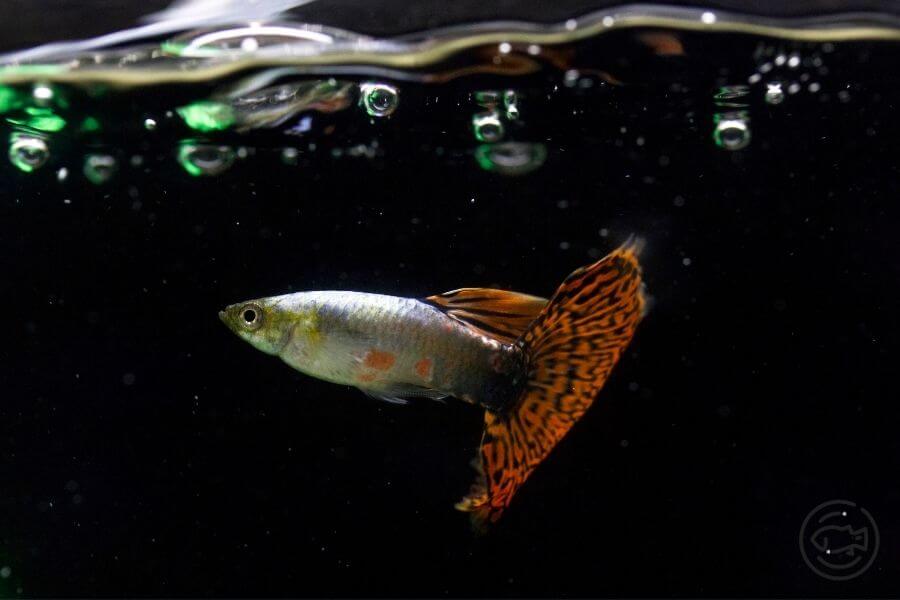Guppies can endure in an extensive range of temperatures but will do best at about 75°F (24°C). At this temperature, their water should be around 72°F (22°C). This is why it’s important to buy a thermometer to monitor your guppy temperature in water.
What temperature can guppies survive in?
There are many different types of guppies, and some can handle lower or higher temperatures than others.
Some species of guppy that generally come from the tropics (or similar climates) cannot survive in cold weather.
Other varieties, such as Bettas and Gouramis, prefer warmer conditions and will not fare well if kept in colder water.
Tropical fish usually like water between about 76-86 degrees Fahrenheit (24-30° Celsius).
Bettas (Betta splendens), originating from Thailand, do fine at those lower limits but prefer warmer waters around 80-85 degrees Fahrenheit (27-29° Celsius).
Gouramis native to Asia prefer slightly more guppy temperature tolerance, ranging from 70-81 degrees Fahrenheit (21-27°Celsius).
Gouramis usually do best at the slightly warmer end of that range, while Bettas prefer it on the cooler side. Guppies native to tropical climates will need the higher end of that range, between 78 and 82 degrees Fahrenheit (26-28° Celsius).
Many people keep their aquariums without a heater or filter; this gives them more room for decoration.
However, unless your tap water is very warm (over 80 degrees), you won’t want to do this with tropical varieties of guppy because they’ll be living in suboptimal conditions.
If you’re keeping your fishbowl in a room that stays warm, however, this is fine, as long as the temperature doesn’t vary too much.
You can also use an aquarium heater or small ceramic heater with a thermostat to keep the water at your desired temp.
Guppies are among the more sensitive fish varieties. Temperatures vary low or too high can cause them to get sick and eventually die.
The best temperature for guppies is around 25 degrees Celsius (77 degrees Fahrenheit). In some places, however, their native region’s water temperatures go below that level in wintertime.
So what happens then? Can guppies survive in these conditions? How do they adapt?
Yes, guppies can survive in cold water conditions even if it means going through a process called brumation.
When the guppies living under winter temperatures go below 13 degrees Celsius (55° Fahrenheit), they use this process to survive.
Before continuing this article’s discussion, make sure you fully understand what brumation is and how it works by reading this link here.
Ideal Water Temperature for Guppies?

Guppies are small, colorful fish that should be kept in water with a temperature range of 22-28 °C (71-82°F).
For most people with normal house temperatures, no additional heating should be required at all, especially if you have live plants in your tank, which can help provide structure for good bacteria to grow on and shade for the fish during high noon.
When you leave your guppy’s tank outside these boundaries for an extended period or set it below this limit suddenly on purpose, they can become sick and die very quickly.
If you don’t want to spend any funds on purchasing aquarium heating equipment for them, then I recommend looking at other types like goldfish, which enjoy colder waters because when their environment changes too much from what is comfortable enough; some animals may get stressed out easily causing illness/mortality rates among different groups within its species.
Guppies are great for beginners because they can be kept in a bowl or tank without an expensive heater, but if you’re ready to invest, these fish might enjoy the warmer water too.
There are other types of tropical freshwater aquarists out there that thrive under warm conditions.
Suitable Guppy Temperature Range In Winters
The first thing that guppies do to survive in cold water is that they become nocturnal. This helps them save energy since the temperature is lower at night when there’s less sun.
Nocturnality, however, is not specific only to these fish; it is present among all animals living under extremely cold temperatures.
The same way you don’t see people out running or biking during an icy day, guppies also seek shelter during extreme weather conditions.
They hide inside caves and cracks on rocks where the temperature remains more stable throughout the day—being able to move around effectively while being hidden is important.
If not, they wouldn’t be able to sneak up small insects that are usually their main food source for energy.
This strategy works because of how the guppies‘ metabolism runs in wintertime. It should be noticed that metabolic reactions work faster when temperature increases while slows down when it’s colder.
This means that the guppies’ bodily processes are much slower during winter, which prolongs their lifespan considerably. A guppy born in the summertime might live up to 3 years, while one born in winter can make it until five.
Do Guppies Need Heater?

If you’re breeding guppies in the tropical region of the world with high temperatures all year round, then it doesn’t matter whether or not they have access to heaters.
But if your home has winters below 68° Fahrenheit (20 Celsius), be sure and provide them some form of warmth!
If you want to hold guppies in outside ponds and inhabit a moderate climate, their home must have stable air temperatures.
Even if your house feels warm enough for humans with heaters on them all day long (or at least most of the time), fluctuating room temperature can become an issue when housing these animals who need consistent levels around 72-76 degrees Fahrenheit during winter months through summertime hours.
Heating up water faster than it’s gotten cooldown will cause fish diseases like Ich or Fin rot.
An exponential increase or decrease in temperature with no consistent temps over time can affect the guppies in your aquarium.
The right heater for your aquarium is one that keeps the water at a certain temperature, and when it comes to aquarium heaters, the choices are many.
From quality and pricing, you should also pay attention to picking a size that will warm water efficiently for your guppy or a betta.
One good rule of thumb is 5 watts per gallon– which means if there are 20 gallons in an aquarium with this type of heater, then only need one wattage unit. This way, all those little guys get their needs met without overdoing things.
If you undersize the heater, it will lead to inefficiencies because the water won’t be warmed up enough.
Also Read: Stomatella Snail – Good or Bad for Your Reef Aquarium?
Winter Guppies Vs Summer Guppies
What makes this adaptation process difficult, though, is dealing with the long-lasting darkness.
The thing about nocturnal animals is that their eyes need a longer time to adjust from the light entering them. In this case, it would mean that they have a really bad vision for a long period, making it harder for them to hunt efficiently.
This is why during wintertime there’s not much food available in nature.
A second adaptation process comes into play here; Erythrism.
Erythrism has red pigments inside your skin. It helps you absorb more heat and usually develops in places like ears or near the brain (which are cold).
The thing about guppies is that they don’t develop these bright colors during wintertime; they go pale instead.
This happens because they lack access to foods with high amounts of carotenoids (the pigments that make beaks and feathers red).
Their skin becomes pale because it lacks these important materials, which are vital to their survival.
Tank Requirements for Guppies
Water Temperature
Since they come from tropical regions, the water temperature in their habitat is usually at least 72°F (22°C). They can survive anywhere between 68°F (20°C) and 82°F (28°C), but this range isn’t recommended for long-term health.
Generally speaking, warmer temperatures mean more active guppies with increased metabolism, so it’s important to check this regularly to ensure they aren’t overheating or becoming too sluggish. It would be best to put them aside from fans, vents, or open windows.
Filtration
Guppies are constantly swimming around, so they produce a lot of waste. This can cloud the water and make it difficult for them to breathe, not to mention that it also encourages the growth of harmful bacteria.
You should have a filter capable of filtering out waste while providing extra surface area for good bacteria to grow on (a process called “biofiltration”).
More biofilters mean more dissolved oxygen in the tank, which is very important because guppies don’t have a labyrinth organ or an organ allowing them to get oxygen from more than one way.
Guppies get most of their oxygen from bubble nests at the top of the tank via mouth pumping.
When caring for any tank, you should provide the appropriate lighting.
But since guppies come from tropical regions, they do best with strong lighting, especially if the water temperature is below room temperature (if your tank is in a cool room, it might be beneficial to keep the lights on 24/7).
This gives them an advantage over any potential predators who can’t see as well in dark areas like their natural habitat.
Temperature
Temperature is the biggest factor that determines whether or not your guppy will make it out alive.
If you notice your guppies breathing heavily or losing color, this is because of low oxygen levels and stress caused by the water being too hot or cold for their metabolism.
Be sure to check the thermometer regularly (every day) to ensure that the guppy temperature is within the ideal range as mentioned above.
Water Condition
Guppies are not usually picky with water conditions since they come from tropical regions, so any pH of 5-8 is acceptable. Hardness isn’t something to worry about either, so any normal tap water condition should be fine.
Feeding
You should usually feed your guppies live food (small worms, brine shrimp, bloodworms, daphnia) at least 3-4 days per week if they are younger than six months old or 2-3 times per week if they are older than that.
If you like to “gut load” the food you give them by feeding it first, this can help extra supply nutrients for your fish and increase growth rate and color.
Water Changes
This is very important since guppies can excrete waste quickly even with a filter (more biofilters means more surface area exposed for good bacteria to adhere), so a water change should be done roughly once a week or as needed.
Other
There are no other things that you should worry about as long as you keep your guppies happy and comfortable in the environment they’re provided with.
If your fish seem lethargic or have pale colors, then the temperature might be too low for their metabolism. You can slowly lower it by 1-2 degrees over time if this happens since lowering it too quickly can be stressful for your fish.
All in all, Guppies can survive in water temperatures as high as 85 degrees Fahrenheit. The warmer the guppy temperature, the higher their metabolism is, and they use energy faster, so it’s important to provide them with a constant food supply.
They also have added complexity in monitoring their body heat.
If you live where your tap water gets really hot during the summer months or these days are especially hot, guppies might not be able to stay alive for long periods.



